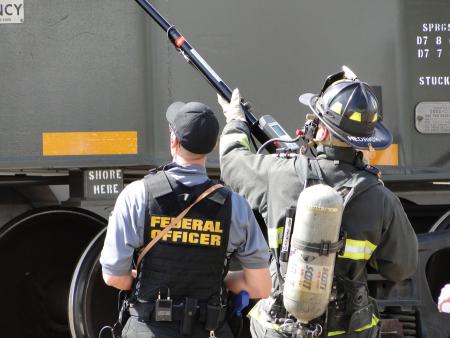Nuclear Materials Transportation Overview
A program of oversight for nuclear materials transportation was developed as the Hazardous Material Section's involvement in nuclear materials expanded in scope legislatively and operationally. Colorado has long recognized the importance of minimizing the potential risk to the public health, safety, and welfare of the citizens of the State of Colorado from radiological and nuclear materials and waste. As an origination point of nuclear waste as well as a corridor state through which nuclear materials transit, the State has involved itself in proactive measures to prevent transportation incidents or to mitigate the effects of a transportation accident. Preparedness efforts have lead to the development of safe and environmentally acceptable methods of transporting nuclear materials within this state in a manner consistent with state and federal laws. Colorado Revised Statutes and well as the Code of Colorado Regulations actively address nuclear materials topics including routing, escorts, and how to acquire a Hazardous Materials Permit in addition to a Nuclear Materials Transportation Permit.
The Colorado State Patrol Hazardous Materials Section serves as the designated agency to address current and anticipated nuclear materials and waste transportation shipments through the state. In this capacity, the Colorado State Patrol is notified in advance of transportation of certain shipments of nuclear waste and spent fuel through the State of Colorado, as required by Section 301 of Public Law 92-295 and implemented by provision in Title 10 of the Code of Federal Regulations (10 CFR), Parts 37, 71, and 73.
For over 30 years the State of Colorado has had a dynamic partnership with the US Dept. of Energy in support of safe and uneventful transportation of radioactive and nuclear material and wastes through Colorado, across the western states, and across the nation. Please click here to learn more about the Colorado WIPP Program and the vast resources which have been made available to the citizens of Colorado in support of prevention, preparedness, response, mitigation, and recovery.
Regional coordination groups and non-profit organizations play a vital role in the planning for and oversight of transportation involving radioactive and nuclear waste and materials. The Colorado State Patrol serves on several committees that work not only at a regional level but on a national level to promote the safe transportation of radioactive and nuclear materials and waste across the nation:
- Western Interstate Energy Board – WIPP Transportation Technical Advisory Group. This committee is primarily involved in regional matters involving the transportation of transuranic waste to the Waste Isolation Pilot Plant. Transportation planning extends to other waste streams such as USDOE Spent Nuclear Fuel, USDOE Lightly Irradiated Fuel, University Spent Nuclear Fuel, and past campaigns of USDOE Nitric Acid, and the USDOE Urgent Cesium Return Program.
- Western Interstate Energy Board – High-Level Radioactive Waste Committee. This committee works on transportation planning matters dealing with the future movement of commercial spent nuclear fuel either to interim storage or final disposal in a geologic repository. This is of particular interest to the citizens of Colorado because it concerns the future highway transportation of commercial spent nuclear fuel, which USDOE took title to, that is currently in interim dry storage at the Fort St. Vrain Independent Spent Fuel Storage Installation in Platteville, CO.
- Commercial Vehicle Safety Alliance – Hazardous Materials Committee and Level VI Inspections Program Committee. These committees are dedicated to promoting safety of commercial motor vehicles that are transporting hazardous materials including radiological and nuclear materials by providing leadership to enforcement, industry and policy makers. They have been responsible for developing standards for inspector certifications for conducting driver or vehicle inspections, inspection procedures and Out-of-Service Criteria which provide uniform tolerances for roadside inspections.
There are a number of radiological and nuclear waste streams that are in transportation across the nation. The primary modes of transportation are highway and rail. The Colorado State Patrol works in collaboration with a number of federal agencies to assure the cooperative planning for the safe transportation of radioactive and nuclear material and waste through Colorado including:
- US Dept. of Energy
- Environmental Management
- Carlsbad Field Office for the Waste Isolation Pilot Plant Program
- National Nuclear Security Administration
- Office of Secure Transportation
- Material Management and Minimization
- Naval Nuclear Propulsion Program
- Off-Site Source Recovery Project
- Nuclear Regulatory Commission
- University shipments of Spent Nuclear Fuel
- US Department of Transportation
- Federal Railroad Administration
- Federal Motor Carrier Safety Administration
Return to main Nuclear Materials Transportation Oversight page.
